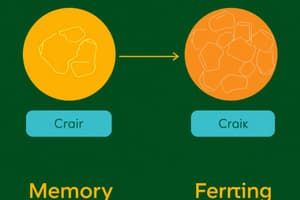Podcast
Questions and Answers
What is memory?
What is memory?
- Unusually good and bad memory (correct)
- The ability to recognize faces
- A type of learning
- A process of sensation
What did Solomon Shereshevsky achieve?
What did Solomon Shereshevsky achieve?
He could memorize 70 digits or words both forward and backward.
What is the primary characteristic of Clive Wearing's memory impairment?
What is the primary characteristic of Clive Wearing's memory impairment?
He cannot remember things that happened more than a minute or so before.
What happens to everyone in life without memory?
What happens to everyone in life without memory?
What does the Atkinson-Shiffrin model consist of?
What does the Atkinson-Shiffrin model consist of?
Which of the following is an example of sensory memory?
Which of the following is an example of sensory memory?
What are the three processes of memory in the information processing model?
What are the three processes of memory in the information processing model?
What is echoic memory?
What is echoic memory?
What is the main function of short-term memory?
What is the main function of short-term memory?
How does echoic memory differ from iconic memory?
How does echoic memory differ from iconic memory?
Define implicit memory.
Define implicit memory.
What is the primary characteristic of explicit memory?
What is the primary characteristic of explicit memory?
Give an example of episodic memory.
Give an example of episodic memory.
Match the following types of memory with their descriptions:
Match the following types of memory with their descriptions:
Flashcards are hidden until you start studying
Study Notes
Memory Overview
- Memory encompasses different forms, ranging from excellent to poor performance.
- Key models of memory include the Atkinson-Shiffrin model, which consists of sensory memory, short-term memory, and long-term memory.
Amazing Memory Capabilities
- Solomon Shereshevsky memorized 70 digits and words both forward and backward.
- Rajan Mahadevan memorized over 30,000 digits of pi by recognizing sequences.
Savant Memory Example
- Stephen Wiltshire, diagnosed with autism, can create detailed drawings of entire cities after brief observation, showcasing exceptional memory skills.
Impact of Memory Loss
- Absence of memory would eliminate joy, render individuals unrecognizable, and make languages seem foreign.
Clive Wearing Case
- Clive Wearing, a classical musician, suffered major brain damage due to encephalitis, leading to severe memory impairment.
- He can’t remember events beyond a minute and believes he is continually regaining consciousness, although he retains some musical skills.
Theories of Memory Structure
- Memory frameworks have evolved alongside technological advancements.
- The Ancient Greek "wax tablet" analogy likens memory to stamping impressions that can fade over time.
Modern Memory Analogies
- The computer analogy equates information processing in computers to how human memory functions, highlighting encoding, storage, and retrieval processes.
Atkinson-Shiffrin Model Details
- Sensory memory captures environmental stimuli, short-term memory processes information, and long-term memory retrieves stored data.
- Each stage is functionally distinct rather than anatomically defined.
Sensory Memory Explained
- Sensory memory registers environmental stimuli and retains it for mere seconds.
- Specialized sensory receptors activate and store brief traces of stimuli in sensory memory.
Example of Sensory Memory
- The experience of a sparkler creating a continuous circle illustrates how sensory memory retains images briefly, merging multiple points into a cohesive visual.
Sperling's Sensory Memory Experiments
- Sperling's experiments demonstrated that individuals can recall only a few letters but have access to a larger memory store than initially recognized.
- The partial-report technique showed subjects could remember almost all letters when cued to recall a specific row.
Memory Decay and Performance
- Performance dropped as the delay between stimulus presentation and cue lengthened, confirming the rapid decay of sensory memory.
Visual Sensory Memory
- Known as visual information storage (VIS), it decays swiftly and allows information transfer to long-term memory.
- Scanning occurs at approximately one letter every 10 milliseconds.
Echoic Memory Insights
- Echoic memory lasts longer than iconic memory, averaging 3-4 seconds, although limited to one or two items.
- Disruption occurs when new spoken items interfere during recall, especially affecting recency memory.
Short-term Memory Functionality
- Short-term memory, or working memory, serves as a temporary holding space and processing hub for new information.
- It facilitates crucial tasks like memorizing phone numbers or solving mathematical problems.
Long-term Memory Characteristics
- Long-term memory retains information for extended periods, with virtually limitless capacity.
- It encompasses detailed recollections from conversations to factual knowledge.
Types of Long-term Memory
- Episodic Memory: Personal experiences or specific events in life.
- Semantic Memory: General knowledge and facts about the world.
- Implicit Memory: Non-conscious retention, including motor skills and priming effects.
Explicit vs. Implicit Memory
- Explicit memory involves facts and experiences that can be consciously recalled.
- Implicit memory surfaces through indirect measures, showcasing learning that occurs without conscious awareness, such as recognizing an object due to prior exposure.
Priming Effects
- Priming influences perception and response to objects based on recent exposure—examples include recognizing words or images quickly after being encountered before.
Measurement of Implicit Memory
- Assessment of implicit memory is indirect.
- Indirect measurements can reveal memory retention even in amnesic patients who do not consciously remember previous encounters.
Studying That Suits You
Use AI to generate personalized quizzes and flashcards to suit your learning preferences.




